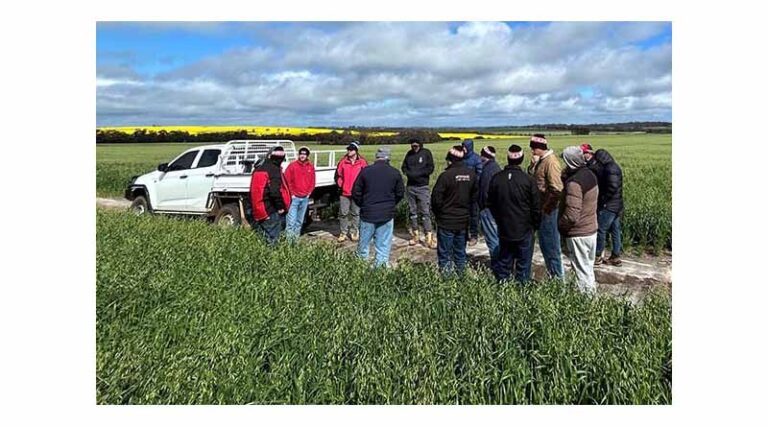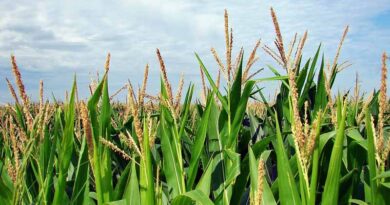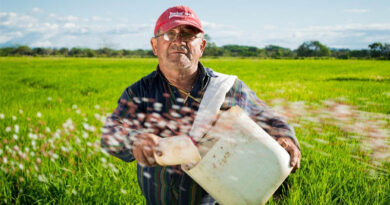
Ariah Park Farmers Explore WA’s Broadacre Systems
22 October 2025, AU: Led by Elders Ariah Park agronomists Terry Edis, Lisa Cumming and Elders State Technical Services Manager Craig Farlow, the tour was supported by the Grains Research and Development Corporation (GRDC).
Over the course of a week in late August, the group travelled from Perth down to Albany and up into the northern grain belt.
The group learnt that sandy soils dominate the west, and farmers there are investing heavily in practices such as deep ripping and clay spreading to improve structure and water-holding capacity.
Craig Farlow said WA growers using more soil testing and mapping tools to identify soil type variability and nutritional constraints within paddocks was an interesting takeaway.
“They’re using precision ag technologies such as Electromagnetic (EM) and Gamma Radiometrics to map soil types, recognising that different soils respond differently to management,” Craig said.
“For example, some soil types benefit greatly from clay spreading, others respond better to deep ripping, while others are constrained more simply by soil fertility.”
Canola production in WA was a real eye-opener to the group. With the crop in full bloom in late August, the landscape was a sea of yellow and green almost in equal parts.
“Canola has a great fit in WA rotations,” Craig explained.
“As their main break crop for cereals, canola has largely overtaken lupins due to higher profitability and better weed control options.”
Around 70 per cent(pc) of the canola crop is sown to genetically modified (GM) herbicide-tolerant hybrids, with adoption climbing to as high as 99pc in northern regions. For many in the Ariah Park group, where GM adoption is far lower, this was a striking contrast.
The discussions also highlighted risks, and the group visited Curtin University to hear about WA’s challenges with fungicide resistance in both broadacre cropping and horticulture. In some cases, relying on fungicides to manage diseases in tight crop rotations and in varieties with lower plant disease ratings has been a recipe for diseases like powdery mildew to develop resistance relatively quickly.
Damien Gaynor from Underwood, Ariah Park, said the tour was well organised and that the opportunity to get on-farm and see how WA growers are tackling challenges was particularly valuable.
“Observing different chemical strategies to manage common issues such as ryegrass resistance gave us some great learnings we can take back and adopt in our own farming operations,” Damien said.
“We also saw firsthand how WA farmers are using GM canola along with looking at new camera spray technologies (green on green) to identify and directly target resistant weeds, applying herbicide only where needed and in turn reducing overall chemical use,” he said.
By the end of the tour, participants were reflecting on how crop diversity and careful chemical stewardship would be essential for long-term sustainability, both in WA and back home in NSW.
The trip also reinforced the importance of connection in farming. Several participants described it as a fantastic activity which allowed them to step away from the day-to-day, spend time with neighbours, and share experiences.
Terry Edis said that the sense of community connection was as important as the agronomic lessons.
“It was rewarding to see the group strengthen relationships with each other and build deeper connections as a grower base,” he said.
“Farmers often spend much of their time working alone, so the opportunity to meet new people and connect socially was invaluable. From a learning perspective, the tour gave the group greater clarity around the reasoning behind many of the recommendations and advice we provide.”
For the Ariah Park farmers, the WA tour delivered more than agronomy, it offered perspective, connection, and inspiration.
Also Read: The Quiet Power of Biostimulants: Missing Link in Regenerative Agriculture
📢 If You’re in Agriculture, Make Sure the Right People Hear Your Story.
From product launches to strategic announcements, Global Agriculture offers unmatched visibility across international agri-business markets. Connect with us at pr@global-agriculture.com to explore editorial and advertising opportunities that reach the right audience, worldwide.






